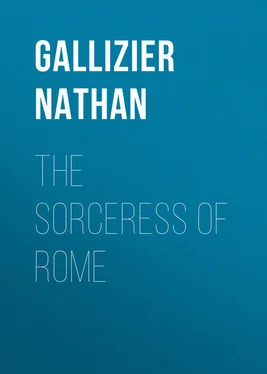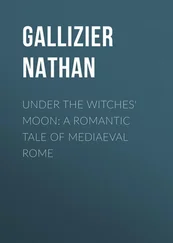Nathan Gallizier - The Sorceress of Rome
Здесь есть возможность читать онлайн «Nathan Gallizier - The Sorceress of Rome» — ознакомительный отрывок электронной книги совершенно бесплатно, а после прочтения отрывка купить полную версию. В некоторых случаях можно слушать аудио, скачать через торрент в формате fb2 и присутствует краткое содержание. Жанр: foreign_antique, foreign_prose, на английском языке. Описание произведения, (предисловие) а так же отзывы посетителей доступны на портале библиотеки ЛибКат.
- Название:The Sorceress of Rome
- Автор:
- Жанр:
- Год:неизвестен
- ISBN:нет данных
- Рейтинг книги:4 / 5. Голосов: 1
-
Избранное:Добавить в избранное
- Отзывы:
-
Ваша оценка:
- 80
- 1
- 2
- 3
- 4
- 5
The Sorceress of Rome: краткое содержание, описание и аннотация
Предлагаем к чтению аннотацию, описание, краткое содержание или предисловие (зависит от того, что написал сам автор книги «The Sorceress of Rome»). Если вы не нашли необходимую информацию о книге — напишите в комментариях, мы постараемся отыскать её.
The Sorceress of Rome — читать онлайн ознакомительный отрывок
Ниже представлен текст книги, разбитый по страницам. Система сохранения места последней прочитанной страницы, позволяет с удобством читать онлайн бесплатно книгу «The Sorceress of Rome», без необходимости каждый раз заново искать на чём Вы остановились. Поставьте закладку, и сможете в любой момент перейти на страницу, на которой закончили чтение.
Интервал:
Закладка:
CHAPTER III
ON THE PALATINE
The moon was rising over the distant Alban hills, when Eckhardt began his ascent. Now and then, he paused on a spot, which offered a particularly striking view of the city, reposing in the fading light of day. No sound broke the solemn stillness, save the tolling of convent-bells on remote Aventine, or the sombre chant of pilgrims before some secluded shrine.
Like the ghost of her former self, Rome seemed to stretch interminably into the ever deepening purple haze.
Colossal watch-towers, four-cornered, massive, with twin-like steeples and crenelated ramparts, dominated the view on all sides. Their shadows fell afar from one to another. Here and there, conspicuous among the houses, loomed up the wondrous structures of old Rome, sometimes singly, sometimes in thickly set groups. Beyond the walls the aqueducts pursued their long and sinuous path-ways through the Campagna. The distant Alban hills began to shroud their undulating summits in the slowly rising mists of evening.
What a stupendous desolation time had wrought!
As he slowly proceeded up the hill, Eckhardt beheld the Palatine's enormous structures crumbled to ruin. The high-spanned vaulted arches and partitions still rested on their firm foundations of Tophus stone, their ruined roofs supported by massive pillars, broken, pierced and creviced. Resplendent in the last glow of departing day towered high the imperial palaces of Augustus, Tiberius and Domitian. The Septizonium of Alexander Severus, still well preserved in its seven stories, had been converted into a feudal stronghold by Alberic, chief of the Optimates, while Caligula's great piles of stone rose high and dominating in the evening air. The Jovian temples were still standing close to the famous tomb of Romulus, but the old triumphal course was obstructed with filth. In crescent shape here and there a portico was visible, shadeless and long deprived of roofing. High towered the Coliseum's stately ruins; Circus and Stadium were overgrown with bushes; of the baths of Diocletian and Caracalla, once magnificent and imposing, only ruins remained. Crumbling, weatherbeaten masonry confronted the eye on every turn. Endless seemed the tangled maze of crooked lanes, among which loomed a temple-gable green with moss or a solitary column; an architrave resting on marble columns, looked down upon the huts of poverty. Nero's golden palace and the Basilica of Maxentius lay in ruins; but in the ancient Forum temples were still standing, their slender columns pointing to the skies with their ornate Corinthian capitals.
The Rome of the Millennium was indeed but the phantom of her own past. On all sides the eye was struck with inexorable decay. Where once triumphal arches, proud, erect, witnessed pomp and power, crumbling piles alone recorded the memory of a glorious past. Great fragments strewed the virgin-soil of the Via Sacra from the splendid arch of Constantine to the Capitol. The Roman barons had turned the old Roman buildings into castles. The Palatine and the adjoining Coelian hill were now lorded over by the powerful house of the Pierleoni. Crescentius, the Senator of Rome, claimed Pompey's theatre and the Mausoleum of the Emperor Hadrian, Castel San Angelo; in the waste fields of Campo Marzio the Cavalli had seized the Mausoleum of Augustus; the Aventine was claimed by the Romani and Stefaneschi; the Stadium of Domitian by the Massimi. In the Fora of Trajan and Nerva the Conti had ensconced themselves; the theatre of Marcellus was held by the Caetani and the Guidi ruled in the tomb of Metellus.
There was an inexpressible charm in the sadness of this desolation which chimed strangely with Eckhardt's own life, now but a memory of its former self.
It was a wonderful night. Scarce a breath of air stirred the dying leaves. The vault of the sky was unobscured, arching deep-blue over the higher rising moon. To southward the beacon fires from the Tor di Vergera blazed like a red star low down in the horizon. Wrapt in deep thought, Eckhardt followed the narrow road, winding his way through a wilderness of broken arches and fallen porticoes, through a region studded with convents, cloisters and the ruins of antiquity. Gray mists began to rise over housetops and vineyards, through which at intervals the Tiber gleamed like a yellow serpent in the moonlight. Near the Ripetta long spirals of dark smoke curled up to the azure night-sky and the moon cast a glory on the colossal statue of the Archangel Michael, where it stood on the gloomy keep of Castel San Angelo. The rising night-wind rustled in organ-tones among the cypress trees; the fountains murmured, and in a silvery haze the moon hung over the slumbering city.
Slowly Eckhardt continued the ascent of the Palatine and he had scarcely reached the summit, when out of the ruins there rose a shadow, and he found himself face to face with Benilo, the Grand Chamberlain.
"By St. Peter and St. Paul and all the saints I can remember!" exclaimed the latter, "is it Eckhardt, the Margrave, or his ghost? But no matter which, – no man more welcome!"
"I am but myself," replied Eckhardt, as he grasped the proffered hand.
"Little did I hope to meet you here," Benilo continued, regarding Eckhardt intently. "I thought you far away among the heathen Poles."
"I hate the Romans so heartily, that now and then I love to remind them of my presence."
"Ay! Like Timon of Athens, you would bequeath to them your last fig-tree, that they may hang themselves from its branches," Benilo replied with a smile.
"I should require a large orchard. Is Rome at peace?"
"The burghers wrangle about goats' wool, the monks gamble for a human soul, and the devil stands by and watches the game," replied Benilo.
"Have you surprised any strange rumours during my absence?" questioned Eckhardt guardedly.
"They say much or little, as you will," came the enigmatic reply. "I have heard your name from the lips of one, who seldom speaks, save to ill purpose."
Eckhardt nodded with a grim smile, while he fixed his eyes on his companion. Slowly they lost themselves in the wilderness of crumbling arches and porticoes.
At last Eckhardt spoke, a strange mixture of mirth and irony in his tones.
"But your own presence among these ruins? Has Benilo, the Grand Chamberlain become a recluse, dwelling among flitter mice and jack-daws?"
"I have not sipped from the fount of the mystics," Benilo replied. "But often at the hour of dusk I seek the solitudes of the Palatine, which chime so strangely with my weird fancies. Here I may roam at will and without restraint, – here I may revel in the desolation, enlivened only now and then by the shrill tones of a shepherd's pipe; here I may ramble undisturbed among the ruins of antiquity, pondering over the ancient greatness of Rome, pondering over the mighty that have fallen. – I have just completed an Ode – all but the final stanzas. It is to greet Otto upon his return. The Archbishop of Cologne announced the welcome tidings of the king's convalescence – truly, a miracle of the saint!"
Eckhardt had listened attentively, then he remarked drily:
"Let each man take his own wisdom and see whither it will lead him. Otto is still pursuing a mocking phantom under the ruins of crumbled empires, but to find the bleached bones of some long-forgotten Cæsar! Truly, a worthy cause, in which to brave the danger of Alpine snows and avalanches – and the fever of the Maremmas."
"We both try to serve the King – each in his way," Benilo replied, contritely.
Eckhardt extended his hand.
"You are a poet and a philosopher. I am a soldier and a German. – I have wronged you in thought – forgive and forget!"
Benilo readily placed his hand in that of his companion. After a pause Eckhardt continued:
"My business in Rome touches neither emperor nor pope. Once, I too, wooed the fair Siren Rome. But the Siren proved a Vampire. – Rome is a enamel house. – Her caress is Death."
Читать дальшеИнтервал:
Закладка:
Похожие книги на «The Sorceress of Rome»
Представляем Вашему вниманию похожие книги на «The Sorceress of Rome» списком для выбора. Мы отобрали схожую по названию и смыслу литературу в надежде предоставить читателям больше вариантов отыскать новые, интересные, ещё непрочитанные произведения.
Обсуждение, отзывы о книге «The Sorceress of Rome» и просто собственные мнения читателей. Оставьте ваши комментарии, напишите, что Вы думаете о произведении, его смысле или главных героях. Укажите что конкретно понравилось, а что нет, и почему Вы так считаете.












